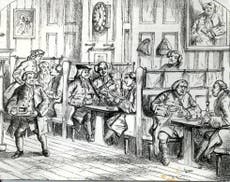Mea Culpa: Some Americanisms are granted exceptional leave to remain
Americanisms, daring exploits and death in this week’s Independent


Several readers have commented recently on Americanisms in The Independent. Bernard Theobald disapproved of “doubles down” in a headline in the Daily Edition: “Trump doubles down on nukes tweet, saying, ‘Let it be an arms race.’” (The website headline was different.)
Huw Pritchard thought this headline on an Independent Twitter account, “Amazon is opening a grocery store where you take the food and walk straight out the shop”, should have said, “straight out of the shop”.
This reflects two trends in usage. One is that half of The Independent readers are now American. That means our expanding American staff, based in New York, write more of our articles, and we take more material from US news agencies and from our partners such as The Washington Post.
The news report about Amazon’s grocery shops was in fact syndicated from the Post, and used American spellings for labor and favorably, not to mention American syntax: “Major grocers were likely not shocked by Amazon’s announcement.”
The other thing that is happening – and which has been happening since the Second World War – is that British people, especially younger ones, keep adopting American usages from TV, films and books. Phrases such as “doubles down” and “walked it back” are now common over here.
The progress of language change is endlessly fascinating. Many young British people, for example, now write “gotten” when they would never say it. Language is changing and The Independent shouldn’t try to be a museum of Posh British English from 1986, when it was founded.
On the other hand, we are a British news organisation, and so our style should be British English without being stuffy about it. So our own comment and reporting should use British spellings for labour and favourably, but American idioms are fine if they are widely understood and British people don’t think they are wrong.
“Doubles down” is all right – it’s hard to think of another succinct expression, although it is a bit a of a cliché already. We should avoid “straight out the shop” in headlines and Twitter posts because it sounds wrong to too many British readers. I’ve written previously about how appeal and protest are now often used in British English without “against”, such as “to appeal or protest a decision”. Again, it is better to avoid putting off readers who think the form is uneducated. If in doubt, stick with British English.
Buckle your swashes: Robert Fisk wrote about the alleged “daring-do” of the Special Operations Executive (SOE) last Friday. John Schluter wrote to point out that the traditional spelling is “derring-do”, and to say “it would be interesting to hear of its roots”.
So it would. According to the Oxford Dictionary it is “from late Middle English dorryng do ‘daring to do’, used by Chaucer, and, in a passage by Lydgate based on Chaucer’s work, misprinted in 16th-century editions as derrynge do; this was misinterpreted by Spenser to mean ‘manhood, chivalry’, and subsequently taken up and popularised by Sir Walter Scott”.
As Fisk was using it in the sense of “daring to do”, rather than any chivalric nonsense, I thought his spelling was good, and we were quite right not to hyper-correct it to the antique misprint.
Exceptional mortality: We carried a wonderful article by Chris Maume on Thursday about the higher than usual number of deaths of famous people this year. Thanks to the rise of celebrity in the 1960s, “there are more famous people than ever before, and they’re all on the Grim Reaper’s to-do list”.
It was also wonderful because it gives me the chance to explain one of my favourite pedantries. Maume wrote: “Keith Richards, still hale and hearty a few days after his 73rd birthday despite a lifestyle to fell an elephant, is clearly the rule-proving exception.”
The “exception proves the rule” is the first half of an old legal maxim, which goes on, “in cases not excepted”. It means that if a sign says “No entry on Thursdays” (the exception) it may be assumed (proved) that entry is permitted on other days (the rule).
There is no rule that rock stars have to die at a given age, and Richards’s survival is no proof of it.
Passing remarks: While we are on the subject, a light tap on the knuckles for the 12 times last week that we used the euphemism “passed away”. We are grown-ups here. We can take the truth. Our style is to say “died”.




Join our commenting forum
Join thought-provoking conversations, follow other Independent readers and see their replies